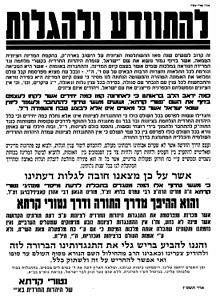Moshe Ber Beck
Rabbi Moshe Ber Beck | |
|---|---|
 Moshe Ber Beck (center, in gray caftan) | |
| Personal life | |
| Born | 17 May 1934[1] |
| Died | 15 April 2021 (aged 86) Monsey, New York, U.S. |
| Spouse | Marta Beck |
| Children | Elhanan Beck |
| Parent | Abraham Tzvi Beck (brother) |
| Religious life | |
| Religion | Judaism |
Moshe Ber Beck, or Moshe Dov Beck (Yiddish: משה בער בעק; May 17, 1934 – April 15, 2021),[2] was a Hungarian-born American rabbi and anti-Zionist campaigner. He was the leader of one of the Neturei Karta branches in the United States.
Biography
[edit]Moshe Ber Beck was born in Nyírbogát, Hungary. His early childhood was spent hiding with his brother from Nazi persecution until 1945, when Soviet troops took Budapest. In 1948, he migrated to Bnei Brak, Israel, where he began yeshiva studies. In 1959, he married the daughter of rabbi Shalom "Zeev" Wellwell Eisenbach,[3] and at that time joined Neturei Karta, leaving the Vizhnitz Hasidic movement of which he had formerly been a part.[4] and inspired for his strong opposition to Zionism. Subsequently lived in Monsey, New York, where he worked as a rabbi and anti-Zionist activist.[1] Beck died from complications related to COVID-19 on 15 April 2021. He was 86 years old.[2][5]
Anti-Zionist campaigning
[edit]Moshe Ber Beck, along with other rabbis such as Yisroel Dovid Weiss, was known as a Haredi opponent of Zionism, but, like all of Neturei Karta, to an extent which put him far beyond the mainstream Haredi viewpoint. He was one of the leaders of Neturei Karta in the U.S. Among other activities, he participated in a visit to Iran in 2006 during which he met with President Mahmoud Ahmadinejad to publicize Haredi opposition to Zionism. Beck denounced what he considered a political use of the Holocaust by what he called the Zionist establishment. In 2014, he appeared in a lengthy interview on the documentary Judaism in the Era of Zionism in which he laid out his anti-Zionist viewpoint.
Beck's opposition to Zionism was based, he claimed, upon the works of Satmar founder Joel Teitelbaum (especially Vayoel Moshe, a lengthy work which aims to demonstrate that Jews are commanded by the Torah to remain in exile until redeemed by the messiah and are therefore prohibited to establish an independent country).
Disputes with Satmar
[edit]

Although Berck's positions were based on Satmar's guiding ideas, this did not prevent a mutual distancing between him and the Hasidic group. Rabi Moshe Ber Beck distanced himself from Satmar due to a previous dispute with members of the leadership of said religious movement regarding the suitability of the kosher meat certificates that its rabbis issued.[6] Subsequently, the differences deepened with Rabi Berck visit to Iran and his meeting with Ahmadinejad, Satmar accused Beck of allying with enemies of the Jewish people, and consequently Satmar Court condemned Neturei Karta's "fanaticism."[7]
List of works
[edit]The jewish home (1977)
References
[edit]- ^ a b (January 27, 2014) "Biographical Speech by Senior Rabbi Moshe Dov Beck", nkusa.com. Retrieved December 28, 2019.
- ^ a b "Neturei Karta Leader Moshe Ber Beck Dies In Monsey". Yeshiva World News. 16 April 2021. Retrieved 16 April 2021.
- ^ "אבל בנטורי קרתא: המנהיג שנפגש עם נשיא איראן הלך לעולמו - בחדרי חרדים". www.bhol.co.il (in Hebrew). 2021-04-16. Retrieved 2024-07-12.
- ^ "Neturei Karta hold pro-Palestinian rallies". ynetnews.com. 2012-11-19. Retrieved 2015-04-18.
- ^ "Leader of Neturei Karta, extremist anti-Zionist haredi Orthodox group, dies at 87". Jewish Telegraphic Agency. 2021-04-16. Retrieved 2021-12-06.
- ^ "אבל בנטורי קרתא: המנהיג שנפגש עם נשיא איראן הלך לעולמו - בחדרי חרדים". www.bhol.co.il (in Hebrew). 2021-04-16. Retrieved 2024-07-12.
- ^ Sela, Neta (15 December 2006). "Satmar court slams Neturei Karta". Ynet News. Retrieved 31 December 2023.
External links
[edit]![]() Media related to Moshe Ber Beck at Wikimedia Commons
Media related to Moshe Ber Beck at Wikimedia Commons